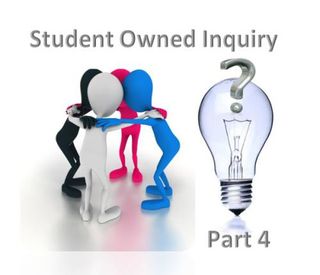
Welcome to this fourth post in a series that promotes student inquiry in the classroom. In this post, I wish to emphasize the idea of knowing what search engines to use for student questions. You will discover multiple resources in this series along with some great ideas for finding student success in student owned inquiry. Before reading, please take a moment to subscribe by email or RSS and also give me a follow on Twitter at mjgormans. I promise you will find some great information coming your way in the posts that follow…So sign up now and please pass this on with a retweet. – Mike Gorman (https://21centuryedtech.wordpress.com/)
Part 4: Facilitating Inquiry in the Classroom… Questions and Search Engines
It is important that students know how to search on the internet. This not only includes the basics of “how to”, but also what search engine to use. In this post, I wish to point out five different types of search engines. They include:
- The Informational Search Engine
- The Human Reviewed Search Engine
- The Computational Search Engine
- The Individualized Search Engine
- The Social Media SeachEngine
While there are more categories and of course more search engines, it is important to become familiar with these five. It is also imperative that students understand that there is still more information available in the somewhat closed web environment. These include reference services and databases. Your school librarian will be happy to introduce you and your students to some of these highly academic resources. Let’s take a moment to look at these five categories and a search engine from each one. After looking them over take a moment to experiment and try each one out. I know you will also enjoy the sites that follow the five categories encouraging your students to work on their search strategies. I am certain you and your students will enjoy the search and the inquiry just as much as the getting the answer. Also, remember that the answer just might lead to new questions and inquiry!
Five Categories of Search Engines with an Example for Each
Google Advanced Search – Informational Search Engine – It may be best to direct students towards the Google Advanced Search Engine even before using the Google Basic Search. In fact, Advanced Search should be used until students understand how to use these advanced techniques in a Basic Search. When educators ask students to search and find information on the internet… it is not to just get the answer. It is to learn an important process that will serve them through future schooling and eventual careers. Take a look at the Google Advanced Search Engine and see why it really should be a basic prerequisite! For those who have been long time users of the advanced search you are probably aware that it is no longer next to the search box in its once prominent location. Instead… it was moved a while ago to the upper right-hand corner appearing as a gear icon and sometimes may not appear until you perform a basic search. The link above takes you directly to the Google Advanced Search Engine. Read more about using the Advanced Search at 21centuryedtech.
Sweet Search – Human Reviewed – It is owned by Dulcinea Media, a company committed to supplying students with a search engine that returns results that are accurate, reliable, safe, and understandable. Instead of having students sift through millions of websites, the research experts, educators, and librarians at Dulcinea have created a database of tens of thousands of sites that students have access to in their searches. As a result, SweetSearch excludes results from unreliable sites that might rank high in other search engines. This allows students to choose the most relevant result from a list of credible returns, rather than having educational time wasted on unreliable sites. Since Sweetsearch is powered by Google, it does allow the ability to toggle results between Google and Sweetsearch. Read more about using the Advanced Search at 21centuryedtech.
WolframAlpha – Computational – Google is best termed an informational search engine… its strength is looking for facts and information. There are also data based search engines, by now you may know that I am referring to Wolfram Alpha. This search engine claims, “to bring broad, deep, expert knowledge to everyone… anytime, anywhere!”. They further state, “We aim to collect and curate all objective data; implement every known model, method, and algorithm; and make it possible to compute whatever can be computed about anything. Our goal is to build on the achievements of science and other systematization of knowledge to provide a single source that can be relied on by everyone for definitive answers to factual queries.”
Google Custom Search – Individualized – This is a unique way to curate and archive sites for students and still require them to practice good searching techniques. Many times as teachers we find our students trying to maneuver their way through the internet jungle often finding sites they cannot understand, are not reliable/credible, or do not apply. As educators, we must help teach our students how to both search and evaluate resources they find. Many times it seems more efficient to just hand out the links. What might it be like if we still controlled the links, but students still had to search? This is the whole idea behind a Google Custom Search! It is also easy to learn, takes very little time, and best of all… free. It also allows the teacher to have a listing of those very best websites in designated areas. You can make as many Custom Search Engines as you wish. All you need is a Google account.
To get started visit the Google Custom Search Engine Page. Here you can either sign in or if you do not have a Google account… sign up. After doing this you are ready. To create a custom search engine from scratch, you’ll need to define a name and description, and add some sites to search. Make sure you have thought this out and have those sites in mind.
Twitter Advanced Search – Social Media Search – This Twitter Search Page is valuable when showing teachers great ways to collect learning resources. Many times after using, they are excited to sign up for their own Twitter account. Using Twitter can have its challenges. With the Twitter Search Page, it may now be possible because no log in or account set up is required. It could be great in finding facts and information. It can also be used with current events or an unraveling news story. Most of all, it can show students the power and educational benefits of social media. As always… before using with students consult your district AUP, Terms Of Use, and check with district administration. As in using any web application, students should be trained on proper digital citizenship and monitoring of students is essential. Read more about the Twitter Advanced Search at 21centuryedtech.
Some sites help with student inquiry and searching skills
Thank you for joining me and I hope you found this information something you can use in your school and useful to share with other educators. As always, I invite you to follow me on twitter (mjgormans). Please give this post a retweet and pass it on to someone who will benefit. To ensure you do not miss a future valuable post or other resource covering PBL, Digital Curriculum, STEM, 21st-century learning, and technology integration please sign up for 21centuryedtech by email or RSS. Have a great week… enjoy the Websites! – Mike (https://21centuryedtech.wordpress.com/
cross-posted at 21centuryedtech.wordpress.com
Michael Gorman oversees one-to-one laptop programs and digital professional development for Southwest Allen County Schools near Fort Wayne, Indiana. He is a consultant for Discovery Education, ISTE, My Big Campus, and November Learning and is on the National Faculty for The Buck Institute for Education. His awards include district Teacher of the Year, Indiana STEM Educator of the Year and Microsoft’s 365 Global Education Hero. Read more at 21centuryedtech.wordpress.com.

